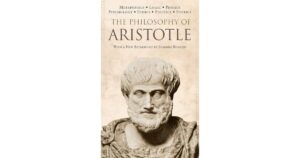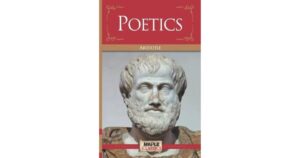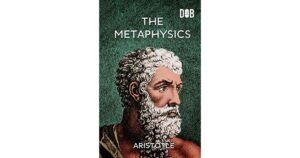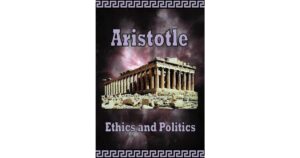Aristotle and His Important Works| Poetics
Aristotle (384-322 BCE) was a Greek philosopher and polymath who made significant contributions to various fields, including literary criticism. His work, “Poetics,” is considered one of the foundational texts of literary theory and criticism.
Table of Contents

Important works of Aristotle:
Logic and Philosophy
- Organon (Instrument): A collection of six works on logic.
- Categories (Categories): A work on classification and categorization.
- On Interpretation (De Interpretatione): A work on logic and reasoning.
- Prior Analytics (Analytica Priora): A work on deductive reasoning.
- Posterior Analytics (Analytica Posteriora): A work on inductive reasoning.
Metaphysics and Philosophy
- Metaphysics (Metaphysica): A work on the nature of reality.
- On the Soul (De Anima): A work on the nature of the soul.
- On the Heavens (De Caelo): A work on cosmology.
- On Generation and Corruption (De Generatione et Corruptione): A work on change and transformation.
Ethics and Politics
- Nicomachean Ethics (Ethica Nicomachea): A work on ethics.
- Politics (Politica): A work on politics and governance.
- Eudemian Ethics (Ethica Eudemia): A work on ethics.
- Magna Moralia (Magna Moralia): A work on ethics.
Biology and Natural History
- Historia Animalium (History of Animals): A work on biology and natural history.
- De Anima (On the Soul): A work on the nature of living things.
- De Plantis (On Plants): A work on botany.
- De Generatione Animalium (On the Generation of Animals): A work on reproduction and development.
Rhetoric and Poetics
- Rhetoric (Rhetorica): A work on persuasion and argumentation.
- Poetics (Poetica): A work on literature and poetry.

Other Works
- Constitution of Athens (Athenaion Politeia): A work on the government of Athens.
- Economics (Oeconomica): A work on household management.
- Physiognomics (Physiognomonica): A work on the relationship between physical appearance and character.
Note: The authenticity of some of these works is disputed among scholars.
Aristotle’s take on poetry and drama is primarily outlined in his work “Poetics”.
Poetry
- Imitation: Poetry is an imitation of life, but it’s not just a copy. It’s an artistic representation of reality.
- Universal: Poetry deals with universal truths, not just individual experiences.
- Emotional Appeal: Poetry should evoke emotions in the audience.
- Rhythm and Meter: Poetry uses rhythm and meter to create a musical quality.
Drama
- Tragedy: Tragedy is a form of drama that evokes feelings of fear and pity in the audience.
- Catharsis: Tragedy provides a safe outlet for emotions, leading to catharsis (emotional purging).
- Plot: The plot should be complex, with a clear beginning, middle, and end.
- Character: Characters should be believable and relatable.
- Hamartia: The tragic hero’s downfall is due to their own error (hamartia).
Key Concepts given by Aristotle:
- Mimesis (Imitation): Art imitates life.
- Catharsis (Emotional Purging): Tragedy evokes emotions, leading to emotional purging.
- Peripeteia (Reversal of Fortune): A sudden change in circumstances.
- Anagnorisis (Recognition): A moment of realization or insight.
- Hamartia (Tragic Flaw): A flaw leading to the protagonist’s downfall.

Influence
Aristotle’s “Poetics” has had a profound influence on Western literary theory and criticism. His ideas on tragedy, plot, character, and catharsis continue to shape our understanding of drama and poetry.
Aristotle’s Contribution to Literary Criticism
Aristotle’s “Poetics” is a comprehensive treatise on drama, poetry, and literature. In it, he explores the nature of art, the role of the artist, and the impact of literature on society. His key contributions to literary criticism include:
- Mimesis: Aristotle introduced the concept of mimesis, or imitation, which posits that art imitates life. He argued that literature should reflect reality and provide a truthful representation of human experience.
- Catharsis: Aristotle believed that literature should evoke emotions and provide catharsis, or emotional purging. He argued that tragedy, in particular, should inspire feelings of fear and pity, leading to a purging of emotions.
- Plot and Structure: Aristotle emphasized the importance of plot and structure in literature. He argued that a well-constructed plot should have a clear beginning, middle, and end, and that it should be driven by character motivation.
- Character Development: Aristotle believed that characters should be believable and relatable. He argued that characters should have flaws and weaknesses, making them more human and accessible to audiences.
- Genre Theory: Aristotle developed a genre theory, categorizing literature into tragedy, comedy, and epic poetry. He explored the characteristics of each genre and their respective purposes.
Impact on Literary Criticism
Aristotle’s “Poetics” has had a profound impact on literary criticism. His ideas have influenced Western literary theory and continue to shape critical approaches today. His emphasis on mimesis, catharsis, plot, character development, and genre theory has informed literary analysis and criticism for centuries.

Influence on Later Critics
Aristotle’s work has influenced many later critics, including:
- Longinus: A Greek critic who built upon Aristotle’s ideas on sublimity and the emotional impact of literature.
- Horace: A Roman poet and critic who developed Aristotle’s ideas on genre theory and literary decorum.
- Modern Critics: Aristotle’s ideas continue to influence modern critics, such as Northrop Frye and Harold Bloom, who have developed his concepts in new and innovative ways.
Conclusion
Aristotle’s contributions to literary criticism are immeasurable. His “Poetics” remains a foundational text, shaping literary theory and criticism for centuries. His ideas on mimesis, catharsis, plot, character development, and genre theory continue to influence critical approaches today, solidifying his position as the father of literary criticism.
Read and learn more: Plato and His Important Works| The Republic







One thought on “Aristotle and His Important Works| Poetics”